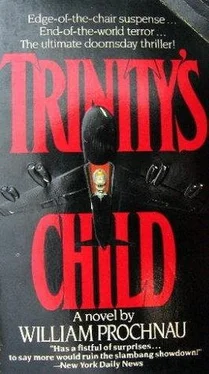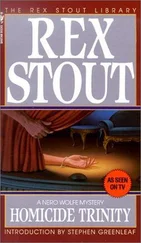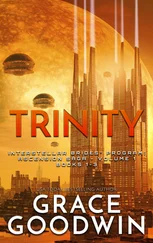The successor stared at him. “Now, Harpoon, I called you in for just one reason. You’ve been down in those submarines. You’ve been up in TACAMO planes. What would happen if the TACAMO planes got conflicting orders?”
The reality of what had occurred sizzled through Harpoon with an electric jolt. Alice had turned the B-52’s. A surge of hope—and curiosity—filled him. “How did the Soviets respond?” he asked slowly.
“Answer me, Harpoon,” Condor commanded.
Harpoon tilted forward in amazement. “You can’t even be considering that now, sir.”
“Answer me. “
“Do you realize what the Soviets have done? Most of their bombers won’t even get back. They don’t have our range. They’ll run out of fuel. The Soviets couldn’t make their intentions clearer. Someone over there is talking directly to you.”
The Librarian cut in abruptly. “And signaling an incredible strategic error,” he said, his tone authoritative and confident. “It is now our entire submarine fleet versus their remaining ICBM’s. It is the greatest shift in the strategic balance in the history of the cold war.”
“Cold war!” Harpoon gasped.
“Alice, through his treason, has built us the perfect mousetrap,” the Librarian said triumphantly, his eyes narrowing to slits behind his spectacles. “We now can win. Do you understand that word, admiral? Win.”
The successor angrily brushed the colonel into silence. He also motioned to the Secret Service agent, who half-reluctantly turned his gray Uzi on the admiral. Harpoon stared, dazed, into the snub-nosed barrel a dozen feet distant. A remote thought tugged at his mind but did not penetrate the crazy clutter of his emotions.
“What would happen if TACAMO got conflicting orders?” the successor asked once more.
Harpoon clipped off his words as if he were automated. “If both commands had the proper codes, they would be confused. They would suspect the Soviets had spoofed one set. They would not know which. They would allow the original orders to stand.”
“That’s all, admiral. You’re dismissed.”
“Please, sir…” Harpoon’s words wavered in a feeble, pitiable sound.
“Dismissed.”
Harpoon turned and shuffled slowly out. At the top of the staircase he gripped the railing for support, trying to force his mind to function properly. Random thoughts collided with random thoughts. He remembered his tour with the Joint Chiefs during the Watergate crisis, when the Defense Secretary had issued quiet instructions to report “unusual” orders from a presumably irrational President. He remembered reading years later that John Ehrlichman, seeking to end all his personal agony, and the national agony as well, had posed at the cockpit door of Air Force One, fighting down the urge to rush it and crash the plane. Harpoon took a single step toward his quarters. Then he pulled back and moved rapidly down the hallway toward the flight deck.
Kazakhs felt the final tiny lurch, the Buff seeming to waft airily free like a feather in the wind, the sensation more in his mind than in reality, as the third and last of the unarmed gravity bombs fell toward the Gulf of Alaska forty-four thousand feet below. One by one the yellow bomb-bay lights flashed off, the giant doors closing again. He began the procedure of scuttling the SRAM’s, popping them harmlessly off the wings. He jettisoned one after another, the flow of the aircraft altering slightly as each disengaged and began its long downward tumble. On the sixth and last missile he hit the release mechanism a second time, then a third. “Dammit,” he muttered. “Shake loose.” For the next several minutes he rocked the aircraft, jiggering the release mechanism, finally trying unsuccessfully to fire the missile to get rid of it. Then he looked at Moreau and shrugged.
She shrugged back. They trimmed the aircraft for the slight imbalance of the SRAM that refused to dislodge and flew on, the added weight and drag an irritant more than a problem on the long, uncertain journey ahead of them.
The awesomeness of the dawn’s first light stunned Harpoon. He paused briefly, taking in the breathtaking if unnatural beauty of the panoramic scene through the now unscreened cockpit windows. Venus winked at him mockingly, the morning star hovering at eye level low over the horizon’s haze. The sun peeped over the earth’s curvature somewhere to the right, out of sight but casting endless tongues of fire-opal reds though strata of clouds both normal and not. He felt ever so fleetingly that man had improved on God, and then he knew that he had not. He slipped forward past the busy cockpit crew and toward the lefthand seat. The pilot turned, a black patch strapped diagonally across one eye, and smiled comfortably at him. ” ‘Morning, admiral,” he said. “You really should wear a patch, even in the daylight.”
“I’m sorry, major,” Harpoon said.
The pilot’s eye looked at him strangely, then darted over the admiral’s shoulder. “What the hell?”
Harpoon began to lunge. He felt a strong hand clasp one of his biceps from behind. He felt the Uzi barrel jam painfully into his midvertebrae. The remote thought that eluded him in the presidential cabin broke decisively through the old barriers. He prayed with quick fervor: Please, God, let him pull the trigger and bring this plane down, too. He felt the Uzi withdraw, the grip tighten on his bicep, damp and jellylike flesh press in where the gun had been. He heard the pilot scream. “For God’s sake, no!” A glint of turquoise flashed in the periphery of his vision. A belt tightened around his neck. Gray metal whipped at the side of his head. He heard himself gurgle and groan. He saw one last spectacular flash of color—the rockets’ red glare of a nation he had guarded, the sun’s bright spasms of a strange new day—and then Harpoon neither saw nor heard nor felt anything.
• 1600 Zulu
The probing irritated Sedgwick greatly this time, for his dreams had become blissful voyages deeper and deeper into a more serene world. He lashed out without looking up and felt a swift, hurtful kick in the ribs. “Doan do that,” a surly voice, upper-Fourteenth Street tough, growled at him. He rolled painfully onto his side in the thin mantle of snow and saw the cherub image retreating again. He also saw, through eyes still half-tracking on his dreams, three larger images looming around him. The light was much brighter now, although it hung in the dull burnt-orange color of smoke. In the background a soft, soulful wind whisked eerily through the canyon.
A different voice spoke. It was deep but rich, mellifluous and feminine. “My son says you has the President down in the hollow.” The voice was time-worn and suspicious. Once again, Sedgwick forced his eyes to focus. Gradually the outline of an immense woman took form. Beside her stood two muscular and sullen teenage boys, perhaps sixteen and eighteen years old. “The Man,” the younger said, his words skittering toward a high, hostile laugh. “Who else you got down there, mofu?” he gibed. “The First Muthah?” The teenager cackled and started to kick Sedgwick again. The older youth grabbed his brother and the woman spoke again in a quiet but confident matronly command. “Zachary, you keep your filthy street mouth shut. You very close to your Lord this mornin’.” The boy pulled back. The woman looked down at Sedgwick with large and unsmiling brown eyes.
Sedgwick reached toward her gratefully. “God bless you for coming, ma’am,” he said feebly.
“Lord’s not blessin’ us for much of anything today, young man,” the woman said with a weariness that had begun long before this day. “Now, what kind of foolery you been tellin’ my son?”
Читать дальше












